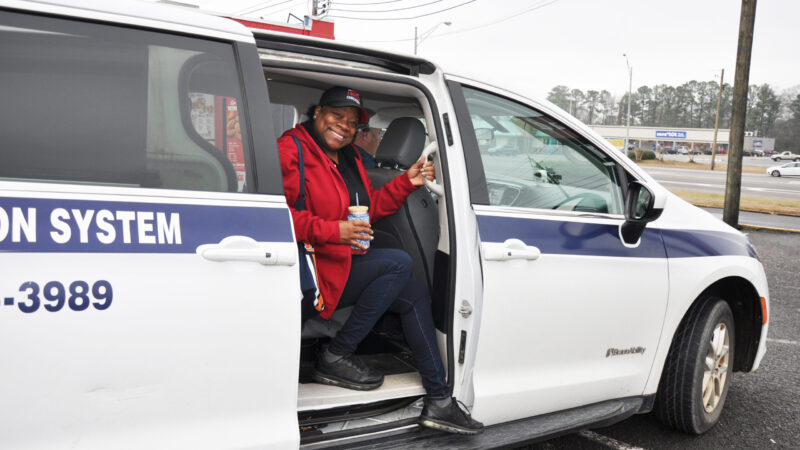Stuff: Where Stuff Goes to Die
Think about all the stuff you have. Probably functional things like a car or cell phone. Also clothing, chairs or a kitchen table. There are sentimental items too, maybe a childhood toy or old pictures. For most of us, we have plenty of stuff.
Those items contain stories and act as a mirror of sorts for our lives. And we’ll explore some of that this week in our series “Stuff.” We start with the end. WBHM’s Andrew Yeager takes a look at where some of our stuff ends up when we’re done with it.
Dozens of people cram the steps to a house in Birmingham’s Forest Park Neighborhood. A sign attached to a ladder invites them to take a number. They were drawn to this house by an estate sale. And when the doors open it’s an orderly torrent.
“Ten. Eleven. 12, 13, 14, 15, 16, 17”
The phrase “on the hunt” keeps coming up. This is serious business after all for people like David Morrison. He’s looking for…
“Records. I’m a record collector and record dealer.”
He says the key to estate sales is to get a low number or try to get in early. The good stuff goes fast Morrison says. He cradles a stack of records he found today.
“Strange stuff. They’re Greek 45s. And so it’s kind of hit or miss. The bad news is if you sell them you have to ship them to Greece.”
Other people use the word “treasure.” Estate sales are frequent entertainment for Penny Nicholls and her husband. They like antiques. Things they can redo or give to family members.
“It’s not that we need anything. You’re not looking for things you need. You’re looking for things that you want.”
Some say they’re just looking for bargains. The $3 shirt or $1 pair of pants. One woman says her whole home is furnished with items from estate sales. Whether driven by bargains, adding to the collection or reselling for some extra cash, the fact remains this used to be someone else’s stuff. And that does cross Penny Nicholls’ mind.
“Kind of sad too sometimes to see the kind of things that were really important to them just thrown out there for little or nothing and you always have to thing about that’s what’s going to happen to yours. My fear is that’s going to happen to your stuff and I’m sure it will, you know.”
In a future life, that stuff could end up here.
Alabama Goodwill
A worker at Alabama Goodwill Industries fires up a bailer, compressing clothes into a stackable block that will be sold as salvage. It could end up in clothing overseas or in roofing materials. Nearby, workers sift through piles of fabric and toss items too worn out onto a conveyor belt, which bring the bailer its next meal. Here in this warehouse, employees move among racks of clothing, stacks of furniture, bins of stuff. They examine donations determining what will make the shelves in Goodwill’s thrift stores.
Alabama Goodwill C.E.O. Don Smith says most of what’s donated are clothes, but they’ll see old luggage, books, jewelry, a lawnmower or a steel trap.
“We got a casket one time. We used it for Halloween pranks. We kept it several years around here and ended up selling it.”
There are items saved in a small office display including a World War II uniform, a copy of the Birmingham News of the first moon landing, a classic cash register and vintage dresses.
A lot of stuff has come through in Don Smith’s tenure. In the beginning, a lot would catch his eye, but he doesn’t notice it so much any more. It’s like when Smith worked at a restaurant in high school. The owner told Smith he could have all the milkshakes and barbeque he wanted.
“That first week, boy, I ate and I drank and I though, ‘Man, this is great!’ You know, after that first week I very seldom drank a milkshake anymore or ate a barbeque. It wasn’t as attractive anymore.”
Smith does have to think about what’s attractive to customers.
“No matter where you have a dollar to spend or a hundred dollars to spend, that person wants to make sure that they get the best value for their buck. If you look at it and it’s worn out, it’s probably worn out for us also.”
Out of style pants probably won’t sell. Non-flat screen TV won’t sell either. And Smith estimates a quarter of what is donated is just plain trash.
“We make several visits each week to the landfill.”
The Landfill
The City of Birmingham operates two landfills.
“That’s the lined area ahead that’s already been covered.”
Paul Ward drives his pick-up around an imposing mound of earth. Beneath it is trash.
“There’s probably 100 feet below where we’re looking at at the bottom and then we go up above on a four to one slope.”
Ward is a Solid Waste Administrator with the city.
“Every individual generates about 5 pounds a day of solid waste.”
Ward says that works out to about 600 tons a day for Birmingham residents. It doesn’t count construction waste. Here at the city’s Eastern Landfill, the public can drop off non-hazardous waste, but Ward is pretty nonchalant about what gets thrown in the dumpster.
“There’s nothing that you would really call unusual. Cause everything that’s made eventually ends up at the landfill somehow.”
Perhaps surprisingly the place doesn’t smell. That’s because the trash gets covered over daily with six inches of dirt. And other than the public dumpster, you don’t really see any trash. Ward says they even try to keep the litter picked up. The fact most people don’t think about the landfill is fine with him.
“Just like the official at the ballgame, if they’re not noticed, they’re doing their job and everything is going right.”
The landfill does recycle some things. But Ward estimates both sites will reach capacity in three years. Then the city will have to open up new areas of the landfill. Seems no matter how many estate sales or thrift stores there are, this will likely be the final resting place for our bargains, treasures and stuff.
Kalshi reveals insider trading case against editor for MrBeast
With prediction markets booming, so have concerns about insider trading. Now, Kalshi has disclosed its first public actions against accounts suspected of trading on confidential information.
Greetings from Jordan’s Wadi Rum desert, where patches of green emerge after winter rains
Wadi Rum's otherworldly landscape is where Star Wars movies and The Martian were filmed. In late winter, plants emerge in this desert — but some are toxic to camels, so their herders must protect them.
Lack of transportation keeps many Alabamians from working. Rural public transit programs are trying to help
While lack of transportation is a major employment barrier in Alabama, few people take public transit to work. That dynamic is even more pronounced in rural areas.
When a horse whinnies, there’s more than meets the ear
A new study finds that horse whinnies are made of both a high and a low frequency, generated by different parts of the vocal tract. The two-tone sound may help horses convey more complex information.
Hundreds of American nurses choose Canada over the U.S. under Trump
More than 1,000 American nurses have successfully applied for licensure in British Columbia since April, a massive increase over prior years.
Trump’s many tariff tools mean consumer prices won’t go down, analysts say
The Supreme Court struck down President Trump's signature tariffs. But the president has other tariff tools, and consumers shouldn't expect cheaper prices anytime soon, economists say.






